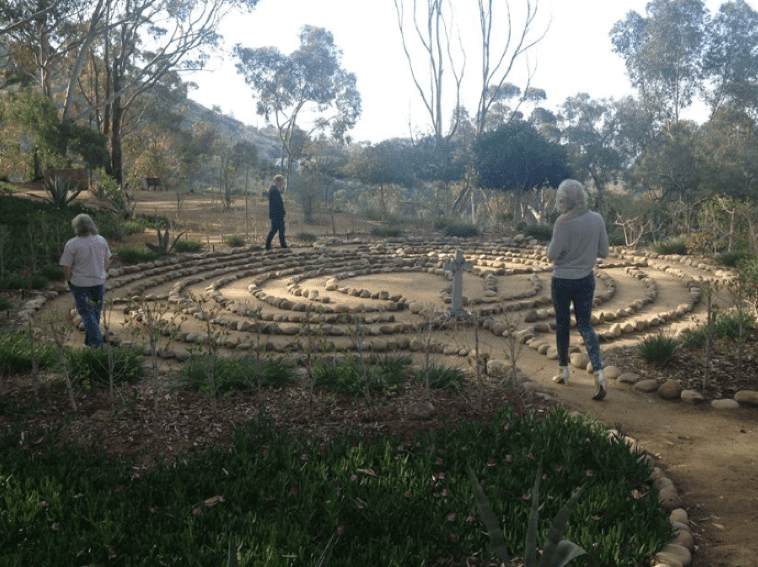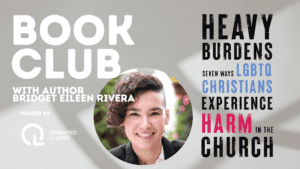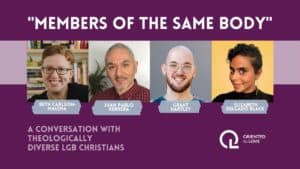
Recently I was at an Oriented to Love dialogue in Malibu. Our group was made up of a dozen individuals from around the US, differing ages and ethnicities and genders, covering a spectrum of experiences and beliefs about how to be LGBTQ in the church; gay, straight, trans, and everything from celibate to questioning to dating to divorced to married. All we held in common was that we follow Jesus and love scripture.
I was asked this question, “What do you think is the value in LGBT people naming and defining their sexuality? How is that helpful or harmful for the heterosexual majority community and the church?”
This is going to sound a bit dramatic, but I responded by saying I think that the LGBTQ community is saving the church. I’m not saying it’s been worth the cost to that community; I grieve that cost and I sorrow over my own complicity in it. What I am saying is that I’m grateful for the gifts I’ve received from the LGBTQ community.
Below are some of the ways I think God is using the LGBTQ community to help the church.
- No longer is “LGBTQ” a theological issue—now it’s real people. It’s people like my brother, Porter. People like my son, Timothy. By coming out, the LGBTQ community has forced the heterosexual community to deal with real people and not just ideas untethered from the world we live in. Jesus emphasized the importance of dealing with real people, so by coming out, the LGBTQ community has been serving the church by enabling us to be more like Jesus. Thank you, friends, for your incredible resilience and strength in reminding me that you are people, not issues. I’m sorry for treating you otherwise too often.
- We’ve had to face our judgment. In his book unChristian, David Kinnaman points out that, statistically speaking, the first three terms non-Christians use to describe Christians, in order, are 1) anti-homosexual, 2) judgmental, and 3) hypocritical. How devastating is that!? Those last two are the very things that Jesus spent a lot of time confronting—in fact, more than any other. So the LGBTQ community has provided the opportunity for Jesus to speak to those of us in the heterosexual community in the same way he spoke to his followers 2,000 years ago. Friends, I’m so sorry for my own judgment and hypocrisy. I’m also sorry for how often I’ve been silent and forced you to speak up alone when it would have been so easy for me to stand up and speak with you. Please forgive me.
- We’ve had to face hard conversations that we’ve previously avoided. Facing hard conversations is what the church is all about, and yet we’ve shied away from that mandate. Instead, we’ve become like the culture and hidden. In fact, we have failed to have these conversations in places where the culture around us has faced them squarely. The LGBTQ community has forced our church to have this conversation, and this conversation is training us to have other conversations. Friends, thank you for the courage you’ve demonstrated every time you’ve come out to someone. I want to be as courageous as you. I could never quantify if it’s worth the cost to you, but I can say that I’ve gained by your sacrifice.
- We’re rediscovering what identity is, what it means to be made in the image of God. The church has simply equated being heterosexual/cisgender (and preferably married!) with being human. It’s like how White, male, Western theologians can be unaware of their Whiteness, maleness and Westernness when doing theology because often they live in an echo chamber only reading their own stuff … until they read Black theology or Feminist theology or Liberation theology. In the same way, the LGBTQ community helps the majority/straight community figure itself out more. And along the way, it helps us uncover our assumptions about being made in the image of God. Friends, thank you for surfacing my assumptions, for helping me see humanity through another lens, and for the implicit invitation to think more deeply about what it means to be made in God’s image.
- The LGBTQ community is helping us rediscover grace, because it’s raising the crucial questions: How are people accepted into the community around Jesus? Do people have to become straight/cisgender to be accepted? Is grace really enough? In new ways, we’re getting at core gospel truths because our assumptions are being exposed, and we’re seeing that we’ve layered a lot of culture on top of the gospel. Friends, thank you for reintroducing me to grace – it’s always better than it was the last time I knew it.
- The LGBTQ community is driving a deeper look at scripture. The majority/heterosexual community is not allowed to get off with easy answers and proof-testing anymore. Just throwing out a reference to Leviticus or Romans was so easy, and so misguided – like throwing out a reference in Joshua to justify war. And not only do we have to be careful and thoughtful with scripture, we’re starting to have to become transparent in our theology of scripture – now we’re having to show our cards on how we approach scripture. We didn’t have to do that before. We could get away with saying, “We just follow the Bible.” Friends, you’ve helped me (and us) think more clearly, enabling us to love God more with our minds. Thank you.
- The LGBTQ community is helping us rediscover unity. Because there’s such diversity around these issues, the church is having to wrestle with unity again. Who is in and who is out? What are the qualifications for unity in the body of Christ? These are really important questions that the church is facing at a new level. While denominations are splitting, there’s also been a lot of movement towards a more sacramental unity, as opposed to the ideological unity that currently presides over the evangelical world. Friends, I wish it weren’t so painful for you. I wish our battles about unity weren’t being fought over your bruised and bloodied souls. I’m so sorry. May God have mercy on us all, healing his church and ‘reconciling to himself all things’ (Colossians 1:20).
Finally, to my son, to my brother, to my LGBTQ friends, whether you’re in church or not, I want to say these words:
Thank you for how gracious you have been to me personally as I try to figure out what to do with you. That sounds so awful, and it is. I’m so sorry for how I’ve participated in the injustice that has left you in the petri dish as those of us in the majority culture fight over the microscope. It’s embarrassing to write it. Please forgive me.
Thank you for how you’ve led me back to Jesus time and time again by exposing how unlike him I am, by helping me think more deeply about scripture, by calling me to love people more freely and especially by how you’ve shown me grace, cared for me, and loved me well.
You have shown Jesus to me. You have been Jesus to me. Thank you.
Bill White is a pastor in Long Beach, CA. His wife is a doctor on Skid Row in Los Angeles, and they have two teenaged kids. The church that Bill helps pastor, City Church of Long Beach, officially launched in 2014. The leadership of City Church formed a Study Team in early 2016 in order to look at issues surrounding participation of LGBTQ persons in the church. The Study Team has been meeting monthly to work through a syllabus of material that covers a range of topics from different Christian perspectives. This article was originally posted on Bill’s blog at LGBTQConversations.



8 Responses
I didn’t see one word of repentance here. So you are saying that homosexuals can just keep on being a practicing homosexual and they will inherit the kingdom of God?
There is not a single word in this post about “practice,” so we are confused as to what you are referring to.
“We”? As in the royal we?
Michael is talking about a theology that condones same-sex behaviour – a practice, or a style of relating that has been forbidden by Scripture.
All this ‘dialogue’ is really just an attempt to use an emotional appeal against what Scripture teachers and what true followers who do not let their attractions define them attest.
The bitterness and hypocricy and Intolerance of your words is SO palpable.
Are you therefore perfect and without sin?.
Are you 100% certain you shall go to heaven?. If so, then why judge?. What equips you to “cast a stone”? ?
Pls the comment below is for you.
Wow!!
??
I notice there was no response to the original question. It’s supposed to be a dialog correct?
“I didn’t see one word of repentance here. So you are saying that homosexuals can just keep on being a practicing homosexual and they will inherit the kingdom of God?”
“There is not a single word in this post about “practice,” so we are confused as to what you are referring to.”
“The bitterness and hypocricy and Intolerance of your words is SO palpable.
Are you therefore perfect and without sin?.
Are you 100% certain you shall go to heaven?. If so, then why judge?. What equips you to “cast a stone”? ?”
The first is the original question, 2nd & 3rd are ‘responses’. Neither of the replies answers the question the first person asked. It’s a perfectly legitimate question in this day and age, in which is not covered by the writer of the article, nor in the answers. One is a short quip, which is partially a deflection, but in the end a non-answer. The 2nd is a someone who doesn’t want to dialog. So, neither answered.